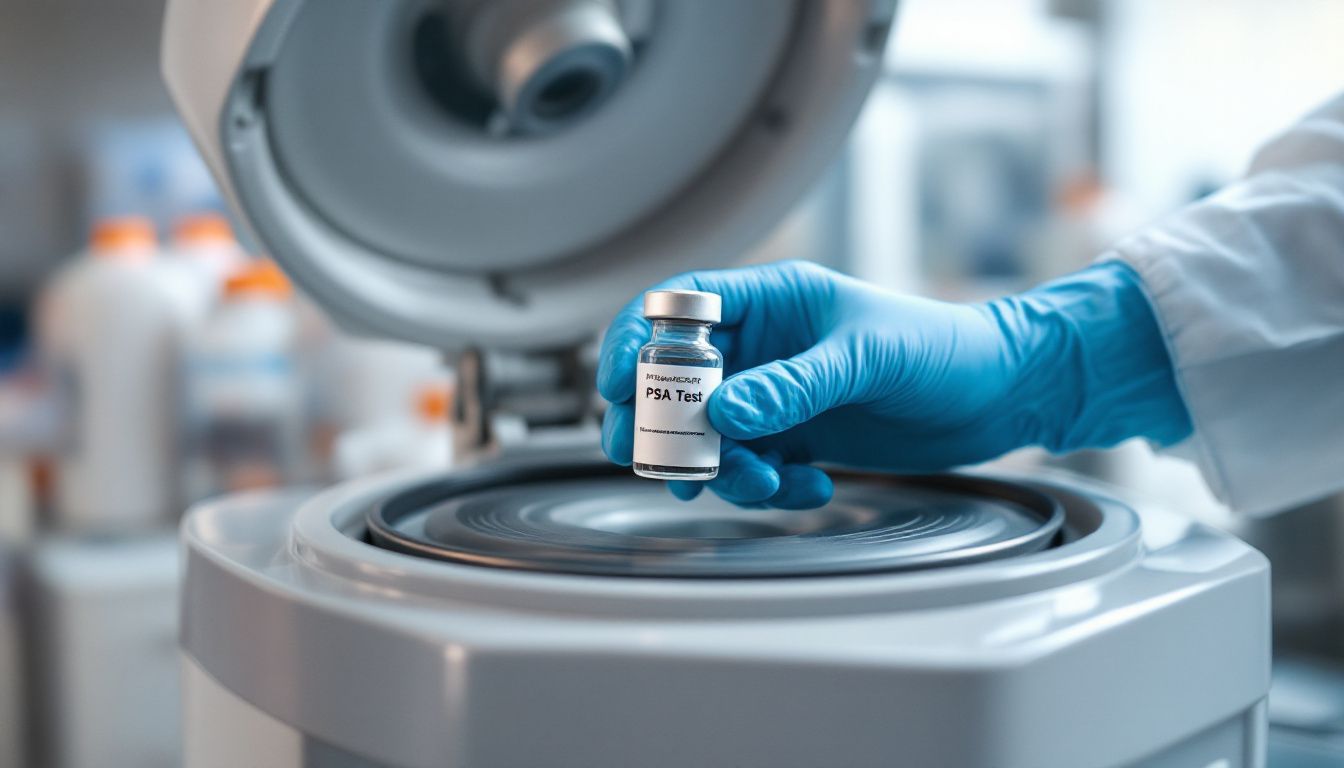Worried about prostate health or cancer risks? The PSA blood test can help detect prostate cancer early, when it’s easiest to treat. This blog will explain the benefits of PSA testing, how it works, and what you need to know.
Thank you for reading this post, don't forget to subscribe!Keep reading—it could save your life.
Key Takeaways
- PSA testing can detect prostate cancer early, before symptoms appear. Early detection improves survival rates and allows for less invasive treatments (Penn Medicine, American Association for Cancer Research).
- Elevated PSA levels may signal inflammation, an enlarged prostate, or cancer. Regular screening helps monitor health changes over time and guides further tests if needed.
- The test involves a simple blood draw to measure PSA levels. Preparation includes avoiding ejaculation or strenuous activity 24-48 hours prior to testing.
- False positives may occur due to non-cancerous conditions like infections or enlargement. Follow-up tests such as biopsies help confirm results if needed.
- Experts recommend men over 50 get regular screenings to track prostate health and catch problems early (Perelman School of Medicine). Early action saves lives!
Importance of PSA Testing for Prostate Health
PSA testing helps track prostate health over time. It can spot problems early, giving men more options for care.
Early detection of prostate cancer
Early detection saves lives. Prostate cancer screening with a prostate-specific antigen (PSA) test can spot the disease before symptoms appear. Catching it early means treatment starts sooner, often leading to better outcomes and less aggressive therapies.
Experts at Penn Medicine stress that survival rates improve drastically with early diagnosis. Regular PSA tests help identify potential issues, offering men a vital chance to act quickly and protect their health.
Monitoring prostate health
Tracking PSA levels helps keep an eye on prostate health. Changes in these numbers may signal issues like inflammation or cancer. Regular testing can catch shifts early, allowing for quick action if needed.
Hospitals like the Hospital of the University of Pennsylvania and Penn Presbyterian Medical Center support routine monitoring. These screenings can help men manage long-term prostate conditions effectively.
Improving survival rates
Early prostate cancer detection can save lives. PSA testing helps find cancer early, often before symptoms appear. Studies show survival rates are much higher with early intervention.
Men diagnosed early have better chances of effective treatment and long-term health.
The American Association for Cancer Research highlights the link between PSA screenings and improved survival outcomes. Data confirms that timely tests lead to more successful treatments.
Prostate cancer screenings, such as those supported by the Perelman School of Medicine, play a critical role in increasing survival odds.

Significance of PSA Levels
PSA levels can show changes in your prostate health. They help doctors decide if more tests are needed.
Indicating potential prostate issues
Elevated PSA levels often point to prostate problems. This could mean inflammation, an enlarged prostate, or even cancer. High levels act as a red flag for doctors to check further.
Regular testing helps catch these issues early.
Changes in PSA numbers over time can reveal hidden health concerns. The information guides decisions about treatment or more tests. Monitoring PSA gives vital insight into overall prostate health…
leading to the next steps in care.
Prompting further investigation
Abnormal PSA levels signal the need for more tests. These may include a biopsy or imaging scans to check the prostate in detail. Such steps help confirm or rule out prostate cancer early, leading to timely care if needed.
High PSA readings guide doctors in deciding next actions. Early treatment decisions can improve outcomes and survival rates. The Raymond and Ruth Perelman School of Medicine at the University of Pennsylvania Health System supports using these tests for better health monitoring.
Procedure for Undergoing a PSA Test
A PSA test is quick and straightforward. A healthcare provider takes a small blood sample to measure your PSA levels.
Preparation
Patients may need to avoid ejaculation for at least 24-48 hours before a PSA test. Ejaculation can temporarily raise PSA levels, which might affect the results.
Physical activity, such as biking or vigorous exercise, should be limited before testing. It’s also crucial to inform your doctor about recent medical procedures or medications you’re taking.
Some drugs may interfere with the test and require adjustment beforehand. Fasting is usually not required unless instructed otherwise by your healthcare provider. Always follow specific preparation guidelines provided by your doctor.
What to expect during the procedure
After preparation, the test happens quickly. A healthcare provider draws a small amount of blood from your arm using a sterile needle. The process takes only a few minutes in a clinical setting.
You may feel minor discomfort when the needle goes in or comes out. Once collected, the blood sample is sent to a lab for analysis. Your doctor will review the results and plan any follow-ups if needed.
Considerations and Side Effects of PSA Testing
PSA testing can cause false positives. This means the test might show elevated levels that don’t indicate cancer. High PSA could also result from conditions like an enlarged prostate or infection.
These situations may require further tests, such as a biopsy, to confirm if cancer is present. This process can sometimes feel stressful for men waiting on results.
Some men experience anxiety after taking the test because of unclear findings. Despite this worry, physical side effects are minimal and rarely cause discomfort during or after testing.
A healthcare provider should guide decisions about whether PSA testing is right for you—leading into how experts view its importance next!
Expert Opinions on the Importance of PSA Testing
Doctors agree on PSA testing’s life-saving potential. Many healthcare professionals urge men over 50 to get regular screenings. Early detection gives patients better chances of successful treatment.
Clinical studies back its value in spotting prostate cancer early.
Experts also highlight how it helps track changes in prostate health over time. Regular tests can catch problems before they worsen, improving survival rates. Testimonials from survivors show the test’s importance for long-term health and peace of mind.
Conclusion
PSA testing plays a big role in keeping men healthy. It helps spot problems early, giving more chances for effective treatment. Early action can save lives and improve well-being. Watching the video can clear up questions and get you informed about prostate health.
Take steps to protect your future—knowledge is power!
